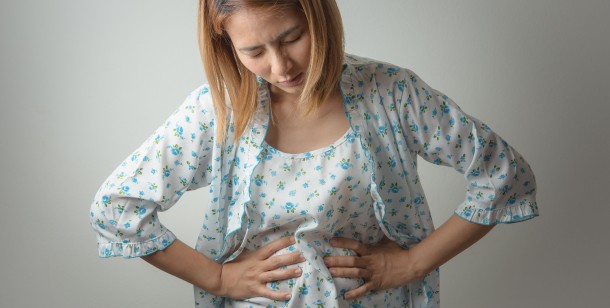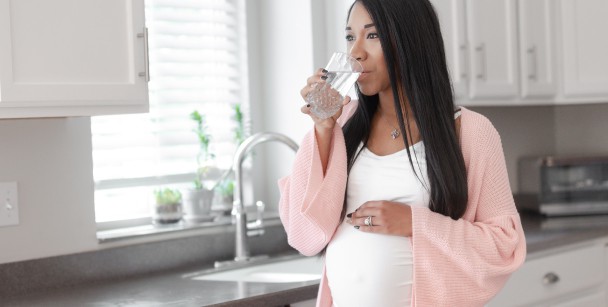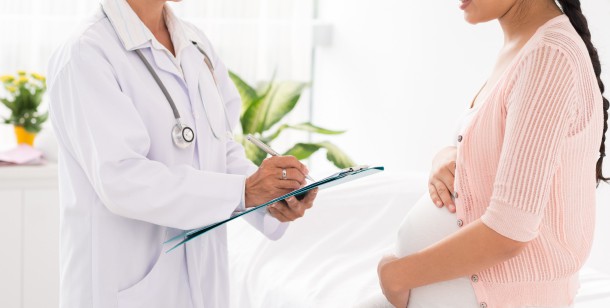During pregnancy, a woman’s body goes through numerous changes and challenges. And while most expectant mothers know to expect certain physical and emotional changes throughout their pregnancy, others may come as an uncomfortable surprise. Rectal bleeding during pregnancy is a common occurrence that many pregnant women experience; keep reading to learn more about the causes of rectal bleeding and find out when to seek medical treatment.

What Causes Rectal Bleeding During Pregnancy?
There are lots of medical conditions in which rectal bleeding can occur. If you notice blood in your stool or on your toilet paper, you may want to explore some of these issues and discuss them with your doctor.
Hemorrhoids
- More often than not, rectal bleeding during pregnancy is caused by hemorrhoids. Hemorrhoids are usually swollen blood vessels in the rectal area and are often the result of straining during a bowel movement or sitting for long periods of time on the toilet bowl. Although they can be alarming and painful, they are typically not a cause for serious concern.
Frequent constipation or diarrhea
- Nearly half of all pregnant women experience constipation and diarrhea. This is caused by a combination of stress, increased progesterone hormones, abdominal pressure from the baby, decreased exercise, or irregular iron levels. These bowel changes can put a strain on the anus, causing rectal bleeding.
Vitamin deficiencies
- Vitamin deficiencies are the culprit of many issues throughout pregnancy. As the body prepares for the fetus’s development and breastfeeding process, the mother needs to consume more foods that are rich in vitamins and nutrients to better support the baby. If a mother isn’t eating enough or supplementing her diet with vitamins, this can oftentimes lead to constipation or diarrhea, which can, in turn, cause rectal bleeding.
Food cravings
- During pregnancy, women often experience food cravings for unique meals. If your diet while pregnant varies drastically from what you are accustomed to eating, then this can cause digestive issues that may lead to rectal bleeding.

Can I Prevent Rectal Bleeding?
If you are experiencing frequent rectal bleeding throughout your pregnancy, there are a few measures you can take to provide a more comfortable pregnancy moving forward! To avoid or prevent the worsening of hemorrhoids and anal fissures, implement some lifestyle changes to help you stay regular and avoid strained bowel movements:
Eat a high-fiber diet
- Eat a diet rich in foods like whole-grain cereals and bread, as well as fruit and vegetables. Avoid heavily processed or excessively sugared foods where possible.
Drink plenty of water
- Dehydration is a key contributor to constipation. By drinking an adequate amount of water, you’ll help maintain comfortable, regular bowel movements.
Exercise regularly
- Partake in low-impact activities to help ease constipation. Workouts like walking, swimming, and yoga help you get moving without putting excess strain on the lower abdominal muscles, preventing pregnancy complications.
Take bathroom breaks as needed
- If you need to go, then go. Holding a bowel movement when you feel the urge can lead to straining later on, so take as many bathroom breaks as you need to.
Take a prenatal vitamin
- Prenatal vitamins will help prevent vitamin deficiency and keep your bowel movements regular and lessen the chance of constipation.
Use a stool softener
- Ask your health care provider if they can recommend some pregnancy-safe stool softeners to help ease constipation.

How to Soothe Pain From Rectal Bleeding?
There are lots of home treatments for bleeding caused by hemorrhoids. If you have hemorrhoids or anal fissures that are causing you discomfort, you may find it helpful to use a cold compress or heating pad, depending on your personal preference. You should also invest in high-quality, soft toilet paper or flushable wipes to avoid unnecessary abrasiveness. Your doctor may also be able to provide a safe topical cream to aid in hemorrhoid relief by soothing inflammation, but these medications are typically for short-term usage.

When Should I See a Doctor About Bleeding Hemorrhoids and Anal Fissures?
Be sure to see a medical professional if you notice bright red blood on your toilet paper or underwear. Although rectal bleeding during pregnancy is usually harmless, it may be difficult to tell whether or not the blood is coming from your rectum or vagina. If you feel that you are bleeding excessively or worry that you are experiencing pregnancy complications, then go to an emergency room immediately.
Don’t Wait for Emergency Medical Care
For first-time mothers, pregnancy is full of unknowns. If you need emergency medical treatment, don’t waste crucial time sitting in a waiting room. Find an emergency room near you and get the treatment you need, fast!
